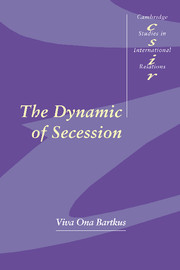Book contents
- Frontmatter
- Contents
- Acknowledgments
- I Introduction
- II The costs and benefits
- III The dynamic of secession
- 7 “Last resorts”: a rise in the costs of membership
- 8 “Opportune moments”: a reduction in the costs of secession
- 9 A reduction in the benefits of membership
- 10 A rise in the benefits of secession
- 11 Conclusion
- Bibliography
- Index
- CAMBRIDGE STUDIES IN INTERNATIONAL RELATIONS
10 - A rise in the benefits of secession
Published online by Cambridge University Press: 22 September 2009
- Frontmatter
- Contents
- Acknowledgments
- I Introduction
- II The costs and benefits
- III The dynamic of secession
- 7 “Last resorts”: a rise in the costs of membership
- 8 “Opportune moments”: a reduction in the costs of secession
- 9 A reduction in the benefits of membership
- 10 A rise in the benefits of secession
- 11 Conclusion
- Bibliography
- Index
- CAMBRIDGE STUDIES IN INTERNATIONAL RELATIONS
Summary
Evaluating the influence of a perceived rise in the benefits of secession on the decision to secede is difficult. Its effect frequently depends on the distinct community's expectations of its own future prospects rather than resting on historical experience. Chapter 6 introduced the two categories of benefits of secession: the greater financial opportunities for ethnic elites associated with sovereign statehood and the security and social advantages for the entire community of implementing the principle of national self-determination. This chapter first revisits these benefits to show that their allure continues to exert pressure in favor of a secession attempt. The main purpose of the chapter, then, is to argue that the gradual but discernible shift in the normative structure of relations between developed and developing countries can also have an impact on the secession dynamic. Wealthier states have assumed greater responsibility in ensuring the viability of their fledgeling counterparts. These newly established states have, to a certain extent, been exempted from the rigours of “normal”power politics. Some have also received considerable financial assistance from industrialised countries to alleviate their economic plight. This new political and economic infrastructure now underpins the numerous weaker states created mainly through the process of decolonization. These shifts become an incentive for secession.
Investgation of such a shift in the fundamental values underpinning international relations returns the focus to the difficult moral issues surrounding the decision to secede.
- Type
- Chapter
- Information
- The Dynamic of Secession , pp. 202 - 215Publisher: Cambridge University PressPrint publication year: 1999

